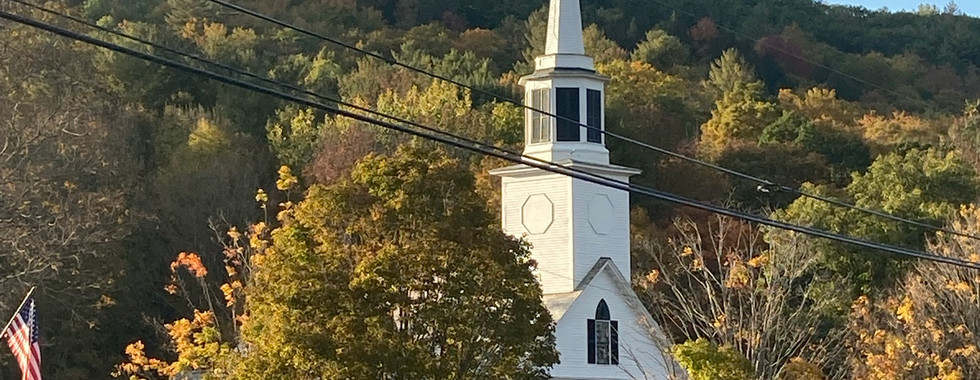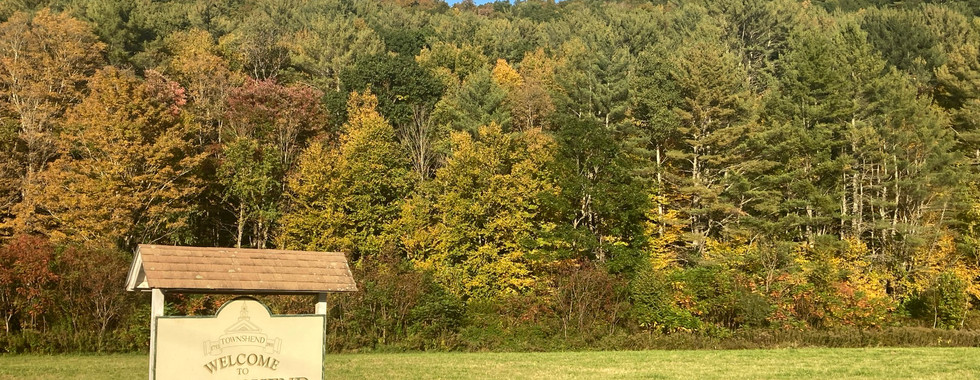Official Town Count | Unofficial Town Count |
77 | 35 |

In early October 2021, I had the pleasure to visit a bunch of towns in southern Vermont as part of my VT 251 exploration. Some are well-touristed, some are not, but they all were beautiful in their own ways. Read on to learn about: STRATTON, NEWFANE, DUMMERSTON, PUTNEY, BROOKLINE, AND TOWNSHEND.
Vermont during foliage season is spectacular which I certainly have not been able to capture with my camera. In this foray, I bring you three new covered bridges and the nugget of information that Stratton is a town, not just a ski mountain (and that the ski mountain is not in the town).
STRATTON
Stratton, VT (the town, not the mountain resort) is a very small town (pop. 440 in 2020) most beautifully accessed during the summer/ fall by driving from Arlington on Kelly Stand Road (mostly dirt). (It can also be accessed by paved road from Wardsboro or up and over the mountain from the Stratton resort). There is some excellent hiking just outside the town, which has about three buildings (one of which was a gift shop).
NEWFANE (& S. NEWFANE & WILLIAMSVILLE)
Newfane, VT was originally chartered as one of the New Hampshire grants (as Fane), on June 19, 1753. But due to the French and Indian War, the town was not settled, which nullified the original charter. A new charter was established on November 3, 1761, as New Fane, and the town was finally settled in 1766. It is another small town (pop. 1,645 in 2020), with a beautiful town green, active farmer's market (Wednesday afternoons), and Dutton Farms (an amazing farm stand/ pick-your-own berry field) on route 30. At one point, a working name for Newfane was Fayetteville, but was voted down, but the Fayetteville Corner store has you covered in case of a tiara (!), candy, or antique emergency in southern Vermont. The town also has a cute railroad museum, and is a really lovely town to visit. South Newfane and Williamsville are villages off the main road (route 30) that are officially part of the Town of Newfane, but they are in a much sadder states. That said, Williamsville has one of the nicest post offices I've seen in the state, as well as a covered bridge which has always been white (to help with visibility).
BROOKLINE
Brookline, VT is a tiny town (pop. 540 in 2020) without a town center. The town was settled in 1777 and incorporated in 1794. The former meeting house and round school house still stand. The brown adjacent building to the school house is where the boys and girls (separate) outhouses were located. Yep, that's all I can say about Brookline.
DUMMERSTON
Dummerston, VT is a small town (pop.was 1,865 in 2020) and is best known for having the longest covered bridge still in use in Vermont. The town has three main villages: Dummerston Center, West Dummerston, and East Dummerston, yet no "real" town center that I could find. Dummerston Center is where the church is and East and West Dummerston are accessible by East-West Road (a very descriptive road name, right?). Historically speaking, in 1716, the town was auctioned to a consortium by the Massachusetts Bay Company (which included William Dummer, lieutenant governor of Massachusetts), and named Dummerston. Years later, the town was chartered as a New Hampshire grant and renamed Fulham by then-Governor Benning Wentworth. But that grant was renegotiated, and the name reverted to Dummerston. Of special note is that Rudyard Kipling wrote The Jungle Book at Naulakha, a house he built in Dummerston to remind him of his past in India and his future in the US. It is open to the public (preserved as a national landmark); if folks want to spend the night in the house that inspired Mowgli and Baloo, it can be done! And a small factoid: Dummerston is the town where the first tennis court in Vermont is located.
PUTNEY
Putney, VT is the self-proclaimed world's best-known small town. That said, by Vermont standards, it isn't very small (pop. was 2,617 in 2020). The town's village center (where the General Store is located) is listed on the National Register of Historic Places, and the town is home to 2 schools (Landmark College & The Putney School). Additionally, is has a lot of farmland (think maple and orchards), and, apparently Santa's Land, which I somehow missed (open summer-Christmas). I feel like I need to go back, because there is also a cheese place called Vermont Shephard that I did not know about.
TOWNSHEND ( W. TOWNSHEND & HARMONYVILLE)
Townshend, VT is a small town near the West River in southern Vermont. The population was 1,291 in 2020 and other than a state park with some stone arch bridges (which I didn't see since I was there at nearly sundown), there's not much to see in the town. Scott Covered Bridge is the longest wooden bridge in the State (not being used any longer). Harmonyville is an unincorporated community Townshend, which as of the 2020 census, had a whopping population of 92. West Townshend is another unincorporated village of Townshend, the entirety of which is listed on the National Register of Historic Places as the West Townshend Village Historic District. Notable in West Townshend are that the Taft family had a homestead there, and that an early women's rights activist (Clarina Howard Nichols) lived there.














































































Comments